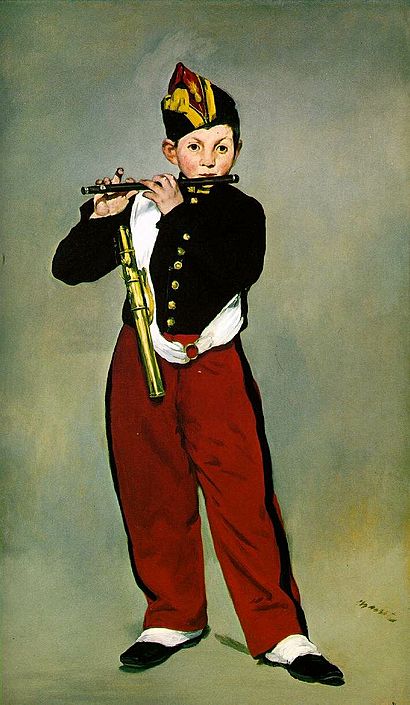The Fifer facts for kids
Quick facts for kids The Fifer |
|
|---|---|
 |
|
| Artist | Édouard Manet |
| Year | 1866 |
| Type | oil painting |
| Dimensions | 160 cm × 97 cm (63 in × 38 in) |
| Location | Musée d'Orsay, Paris |
The Fifer or Young Flautist (1866) is a famous oil painting by the French artist Édouard Manet. It shows a young boy playing a fife, which is like a small flute. This painting is now displayed at the Musée d'Orsay in Paris, France.
Contents
The Story of The Fifer Painting
How Manet Got His Idea
In 1865, Manet traveled to Spain. There, he saw the amazing artworks of Diego Velázquez. Velázquez was a famous Spanish painter. Manet was very inspired by Velázquez's style. You can see this Spanish influence in The Fifer.
Why the Painting Was Rejected
In 1866, Manet sent The Fifer to the Paris Salon. This was a very important art show. But the judges did not accept his painting. Even though it was rejected, the painting was shown to the public in 1867.
A writer named Émile Zola thought the judges were wrong. He wrote many articles defending Manet. Zola's articles were published in a newspaper called L'Événement.
Where the Painting Lived Over Time
Manet passed away in 1883. The next year, in 1884, a big show honored his work. The Fifer was part of this special exhibition.
From 1873 to 1893, a friend of Manet's owned the painting. His name was Jean-Baptiste Faure. He was a French singer and composer. In 1893, the painting went back to an art dealer named Durand-Ruel.
Then, in 1894, Count Isaac de Camondo bought it. He kept it in his art collection until 1911. That year, he gave it to the French government. The painting was meant for the Musée du Louvre. But it was not shown to everyone until 1914.
The Painting's Journey to Its Home Today
In 1947, The Fifer moved to the Galerie nationale du Jeu de Paume. This museum is in the Jardin des Tuileries in Paris. It was part of the Louvre museum at that time.
The painting stayed there until 1986. Then, it moved to the Musée d'Orsay. Many other Impressionist paintings from the Louvre also moved there. Today, you can still see The Fifer at the Musée d'Orsay.
See also
 In Spanish: El pífano para niños
In Spanish: El pífano para niños
 | Janet Taylor Pickett |
 | Synthia Saint James |
 | Howardena Pindell |
 | Faith Ringgold |

